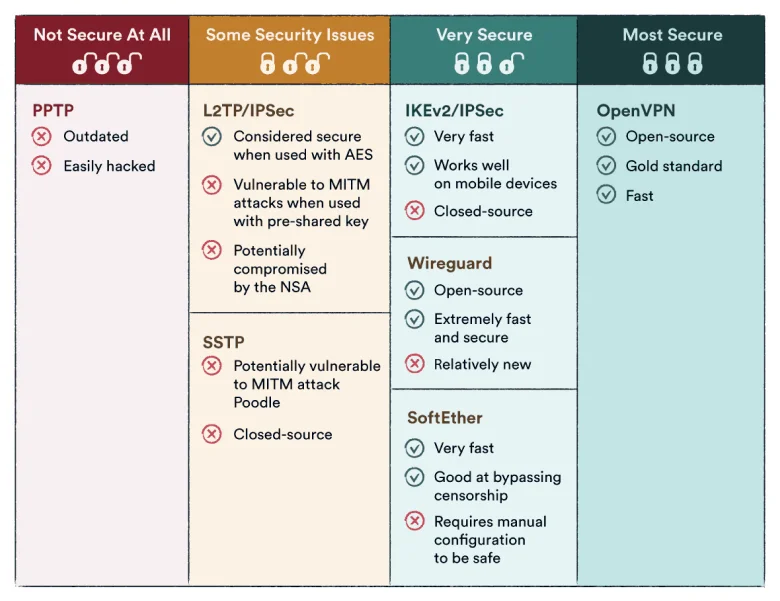
Most Secure VPN Protocol Used for Reliability, Speed of Internet – Discover the best most secure VPN protocol to safeguard your online activities. Learn about its advantages, disadvantages, and FAQs in this informative guide.
In today’s digital age, ensuring the security and privacy of your online data is paramount. The choice of a VPN protocol plays a crucial role in achieving this.
In this comprehensive guide, we delve deep into the world of VPN protocols to identify the best, most secure option available. From detailed explanations to pros and cons, we’ve got you covered.
Understanding VPN Protocols
Before we dive into identifying the most secure VPN protocol, it’s essential to understand what is VPN protocols are and how they work.
VPN Protocols: These are a set of rules and technologies that determine how data is transmitted and encrypted between your device and a VPN server. Different VPN protocols use various encryption methods and security mechanisms.
Popular VPN Protocols
- OpenVPN : Open-source and trusted by many, OpenVPN boasts strong security features.
- L2TP/IPsec : Combines the best of both worlds for robust security.
- IKEv2/IPsec : Known for its speed and reliability.
- WireGuard : The newcomer with exceptional performance.
OpenVPN
OpenVPN stands out as one of the most trusted and secure VPN protocols available today. Its name, “OpenVPN,” is derived from its open-source nature, which means the source code is publicly available, transparent, and continuously reviewed by a global community of developers. This openness contributes to its reputation for reliability and robust security.
The Security of OpenVPN
Security is paramount when it comes to VPN protocols, and OpenVPN doesn’t disappoint in this regard. It employs a combination of cutting-edge encryption techniques to ensure the utmost privacy for users.
Here’s a closer look at the security features that make OpenVPN a top choice:
- Strong Encryption: OpenVPN uses strong encryption algorithms, such as AES (Advanced Encryption Standard) and RSA (Rivest–Shamir–Adleman), to protect data during transmission. These encryption methods are considered unbreakable, even by the most determined attackers.
- Authentication: OpenVPN incorporates robust authentication methods, including user passwords, certificates, and pre-shared keys. This multi-layered approach ensures that only authorized users gain access to the VPN.
- Data Integrity: It also employs hash functions to verify the integrity of data packets, preventing any tampering or unauthorized alterations during transmission.
Cross-Platform Compatibility
One of OpenVPN’s significant advantages is its compatibility with a wide range of devices and operating systems. Whether you’re using Windows, macOS, Linux, Android, or iOS, there’s a high likelihood that you can set up OpenVPN without much trouble. This versatility makes it an excellent choice for individuals and businesses with diverse device ecosystems.
The Open-Source Advantage
Being open-source is a key strength of OpenVPN. This means that anyone can inspect the source code, identify vulnerabilities, and contribute to its improvement. As a result, OpenVPN benefits from a collective effort to enhance its security and performance continually.
Advanced Features
OpenVPN also offers advanced features that cater to various user needs:
- Split Tunneling: This feature allows users to select which internet traffic goes through the VPN and which traffic follows the regular route. It’s useful for optimizing performance and conserving bandwidth.
- Obfuscation: OpenVPN can be configured to use obfuscation techniques, making it more challenging for network administrators or ISPs to detect VPN usage.
User-Friendly Clients
To make it accessible to a broad audience, numerous VPN service providers offer user-friendly OpenVPN clients. These clients simplify the setup process, making it easy for even non-technical users to enjoy the benefits of OpenVPN.
The Downsides of OpenVPN
While OpenVPN boasts numerous advantages, it’s essential to consider its drawbacks as well:
Potential for Slower Speeds: Due to its robust encryption, OpenVPN can be slightly slower than some other protocols. However, advancements in hardware and optimized configurations have mitigated this issue to a great extent.
Complex Configuration: Setting up OpenVPN might require some technical expertise, especially if you’re configuring it manually. However, many VPN providers offer pre-configured OpenVPN settings, simplifying the process for users.
IKEv2/IPsec
IKEv2/IPsec, which stands for Internet Key Exchange version 2 with IPsec, is a VPN protocol known for its exceptional speed, reliability, and robust security features.
It has gained popularity for its ability to strike a balance between performance and protection. In this discussion, we will delve into what makes IKEv2/IPsec a standout choice in the realm of VPN protocols.
Understanding IKEv2/IPsec
IKEv2/IPsec combines two essential components: IKEv2 and IPsec.
- IKEv2 (Internet Key Exchange version 2): This is the part of the protocol responsible for establishing the VPN connection securely. It efficiently handles tasks such as authentication, key management, and secure data transmission. IKEv2 is known for its speed and ability to quickly reconnect to a VPN server when the connection is interrupted, making it ideal for mobile devices.
- IPsec (Internet Protocol Security): IPsec adds a layer of encryption to the VPN tunnel created by IKEv2. It ensures the confidentiality and integrity of your data during transmission. IPsec employs robust encryption algorithms and authentication methods to safeguard your information.
Advantages of IKEv2/IPsec
- Exceptional Speed: One of the standout features of IKEv2/IPsec is its speed. It is designed for high-performance, making it an excellent choice for tasks that require a fast and reliable connection, such as streaming or online gaming.
- Reliability: IKEv2/IPsec is known for its reliability, especially in scenarios where the connection may be unstable, such as when switching between Wi-Fi and mobile data on a smartphone. It can quickly reestablish a secure connection, minimizing interruptions.
- Security: While speed and reliability are its strengths, IKEv2/IPsec doesn’t compromise on security. It employs strong encryption and authentication methods, ensuring your data remains protected from prying eyes.
- Cross-Platform Support: IKEv2/IPsec is supported by various operating systems, including Windows, macOS, iOS, Android, and Linux. This compatibility makes it versatile for users with different devices.
- Seamless Switching: It allows for seamless switching between network connections. This feature is particularly useful for mobile users who move between Wi-Fi networks and cellular data frequently.
WireGuard
WireGuard is a relatively new VPN protocol that has quickly gained recognition for its outstanding performance and modern approach to online security.
With its streamlined design and robust encryption, WireGuard is often regarded as the future of VPN protocols. In this discussion, we’ll explore what sets WireGuard apart and why it’s generating so much buzz in the VPN world.
The Simplicity of WireGuard
One of the defining features of WireGuard is its simplicity. Unlike some older VPN protocols with complex configurations, WireGuard was designed to be lean and efficient. Its codebase is minimal, making it easier to audit and maintain. This simplicity translates into several benefits:
- Performance: WireGuard is exceptionally fast due to its minimalistic design. It processes data packets efficiently, resulting in minimal latency and high speeds. This makes it an excellent choice for activities like streaming and online gaming.
- Ease of Use: Setting up WireGuard is straightforward, even for users with limited technical knowledge. Many VPN providers offer user-friendly apps that simplify the configuration process.
- Security: While WireGuard is simple, it doesn’t compromise on security. It employs state-of-the-art encryption methods to protect your data during transmission. WireGuard’s cryptographic foundation is built on the Noise Protocol Framework, ensuring top-notch security.
Cross-Platform Compatibility
WireGuard is designed to work seamlessly across various operating systems, including Windows, macOS, Linux, Android, and iOS. This compatibility ensures that you can use it on a wide range of devices, making it a versatile choice for users with diverse device ecosystems.
Efficient Battery Usage
For mobile users, WireGuard has another advantage: it’s known for its efficient use of battery power. Its streamlined design minimizes the drain on your device’s battery, allowing you to stay connected for longer periods without sacrificing performance.
Peer-to-Peer Architecture
WireGuard employs a peer-to-peer architecture, meaning that it connects directly between your device and the VPN server. This direct connection eliminates the need for relays or intermediaries, reducing the risk of bottlenecks and potential points of failure. It also enhances your online privacy by reducing the number of entities that have access to your data.
When to Use WireGuard
WireGuard is an excellent choice in several scenarios:
- Speed-Critical Activities: If you require a VPN for activities that demand high-speed connections, such as streaming, online gaming, or downloading large files, WireGuard’s performance is hard to beat.
- Simplicity: If you prefer a VPN that’s easy to set up and use, WireGuard’s minimalistic design and user-friendly clients make it a compelling option.
- Mobile Usage: For mobile users who value both performance and efficient battery usage, WireGuard is an excellent choice.

The Most Secure VPN Protocol
After careful consideration, it’s clear that OpenVPN stands out as the most secure VPN protocol. Its combination of robust encryption, cross-platform compatibility, and open-source nature makes it a top choice for those prioritizing security.
What is the most secure VPN port?
The security of a VPN connection doesn’t depend solely on the port used but rather on the encryption and security protocols employed by the VPN service.
However, VPNs typically use specific ports for their protocols, and some are considered more secure than others. Here are commonly used VPN ports, along with their considerations:
- UDP 1194
This port is commonly associated with OpenVPN. OpenVPN is known for its strong encryption and security features, making it one of the most secure VPN protocols available. Port 1194 over UDP is frequently used because it offers good performance and reliability.
- UDP 500 and UDP 4500
These ports are used for IKEv2/IPsec, a protocol known for its security and reliability. While port 500 is the standard port for IKE (Internet Key Exchange), port 4500 is used for NAT traversal when the VPN is behind a NAT (Network Address Translation) device. IKEv2/IPsec is considered highly secure.
- UDP 443
UDP 443 is often used for SSTP (Secure Socket Tunneling Protocol), which is a proprietary protocol developed by Microsoft. While it operates over the same port as HTTPS traffic (secure web browsing), it provides good security. However, because it’s a proprietary protocol, it may not be as audited as open-source options like OpenVPN.
- TCP 443
TCP 443 is typically used for SSL/TLS-based VPNs, such as those that use the HTTPS protocol. SSL/TLS VPNs offer good security and can bypass firewalls that block other ports. However, they may not be as fast as UDP-based protocols.
- UDP 51820
This port is associated with WireGuard, a modern and efficient VPN protocol. WireGuard is designed with security in mind and is known for its simplicity and speed. While it’s relatively new, it has gained trust in the security community.
It’s essential to note that the security of your VPN connection depends on several factors, including the encryption protocol, key management, and the VPN service provider’s practices. Always choose a reputable VPN service that uses strong encryption and follows best security practices to ensure your online privacy and security.
Should I use IKEv2 or OpenVPN?
The choice between IKEv2 and OpenVPN depends on your specific needs and priorities. Both IKEv2 and OpenVPN are highly regarded VPN protocols, each with its own set of advantages and considerations.
Here’s a comparison to help you decide which one might be the better choice for you:
IKEv2
Advantages:
- Speed and Reliability: IKEv2 is known for its speed and quick reconnection, making it ideal for users who require a stable and fast VPN connection, especially on mobile devices.
- Seamless Switching: It can efficiently switch between different network connections, such as Wi-Fi and cellular data, without dropping the connection.
Best for:
- Mobile Users: If you’re primarily using a VPN on a mobile device and need speed and reliability, IKEv2 is a strong contender.
- Highly Mobile Scenarios: In situations where network connections change frequently, such as during travel, IKEv2’s ability to adapt quickly can be beneficial.
OpenVPN
Advantages:
- Strong Security: OpenVPN is known for its robust security features, including strong encryption and authentication methods. It’s considered one of the most secure VPN protocols available.
- Cross-Platform Compatibility: It’s supported on a wide range of operating systems and devices, making it versatile and suitable for various scenarios.
Best for:
- General Security: If your primary concern is ensuring the highest level of security and privacy for your online activities, OpenVPN is an excellent choice.
- Compatibility: When you need a VPN protocol that works seamlessly across different devices and platforms, OpenVPN’s cross-compatibility is advantageous.
Considerations: - Configuration: OpenVPN may require more manual configuration compared to IKEv2, which has user-friendly clients for easy setup.
- Performance: While OpenVPN offers strong security, it may be slightly slower than IKEv2 due to its encryption overhead. However, with modern hardware and optimized configurations, this performance gap can be minimized.
- Platform: Consider the devices and platforms you intend to use with the VPN. Ensure that the protocol you choose is supported on your preferred devices.
In summary, if you prioritize speed, reliability, and seamless switching between network connections, especially on mobile devices, IKEv2 is an excellent choice.
On the other hand, if you prioritize strong security and compatibility across various devices, OpenVPN is a robust option. Ultimately, your choice should align with your specific usage patterns and security requirements.
FAQs
Is OpenVPN the only secure option?
No, while OpenVPN is highly secure, other protocols like WireGuard also offer strong security features. The choice depends on your specific needs.
Can I use OpenVPN on my smartphone?
Yes, OpenVPN is compatible with both Android and iOS devices, ensuring your mobile data remains secure.
Are there free OpenVPN services available?
Yes, some VPN providers offer free OpenVPN services, but premium options often provide better security and performance.
Will using OpenVPN slow down my internet speed?
OpenVPN can result in a slight decrease in speed due to its strong encryption, but the impact is usually minimal.
Is OpenVPN legal to use?
Yes, OpenVPN is legal in most countries, but it’s essential to use it for legitimate and ethical purposes.
Can I switch between VPN protocols?
Many VPN providers allow you to switch between protocols, giving you flexibility based on your needs.
Conclusion
In the realm of VPN protocols, selecting the best, most secure option is crucial for safeguarding your online activities. OpenVPN, with its strong security features and compatibility, emerges as a top choice.
However, the right protocol for you depends on your specific requirements. By considering the pros and cons, you can make an informed decision and ensure your online presence remains safe and private.





